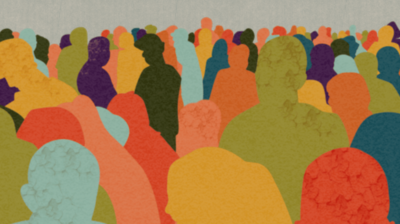Binge Eating Disorder: signs, symptoms and treatment
Learn more about what binge eating disorder (BED) is, why people develop this condition, how to recognise it, and the treatment options available. With the right help and support, people with BED can and do recover.

Binge Eating Disorder (BED) is a common eating disorder characterised by repeated episodes of binge eating. Many people overeat occasionally, but people with BED experience overwhelming urges to eat and feel as though they have lost control over their eating. Binge eating can develop as a way to cope with negative emotions and inner turmoil.
While they share some symptoms, BED is different to bulimia nervosa. When a person has bulimia nervosa, they binge eat and later compensate for binge eating by purging through exercise, vomiting, or laxatives. Conversely, BED does not lead to an immediate purge after a binge. BED can affect people of any gender, age, sexual orientation, body size or ethnicity.
Why do people develop binge eating disorder?
It is not always clear why someone develops BED. The condition doesn’t have one specific cause and the causes are different for different people. Some research suggests that BED has a neurological component. The brain’s ability to control impulses and certain brain chemicals may potentially play a role.
While the condition can seem like it’s all about food on the surface, the root causes of BED are usually far more complex. The behaviours around eating that other people can see are often the external expression of inner emotional turmoil.
Mental health difficulties like anxiety, depression and low self-esteem, a family history of eating disorders, and traumatic experiences are all associated with developing BED. Research has found that emotional abuse and sexual abuse in childhood are associated with developing BED later in life.
To better understand how BED affects a person, it can be helpful to think of it as a coping mechanism. People with BED tend to control food and their body to manage emotional distress. This can help them feel in control when something else in their life is making them feel out of control or unsafe. Recognising this can make it easier to understand how scary it can be to stop engaging in eating disorder behaviours.
Signs and symptoms of binge eating disorder
BED is a mental health condition that causes people to engage in repeated episodes of binge eating. During a binge, a person with BED eat a lot of food in one short time period. During this time, they feel they can’t control what they’re eating, how much they are eating, or when they will stop.
Not everyone with BED has the same profile of symptoms. Different symptoms can emerge as the condition develops over time. People with BED will often try to hide their eating behaviours because they feel guilty or embarrassed. These feelings can make it more difficult to reach out for help. Although it might not always feel like it, it’s important to know that experiencing eating binges is nothing to be ashamed of. You deserve support and understanding.
What is an eating binge?
Eating binges are the central symptom of BED. Bingeing on food is a term that can often come up casually in conversation. However, in the context of eating disorders, an eating binge has a specific definition. An eating binge refers to consuming a significantly larger amount of food than most people would eat within a 2-hour period, given similar circumstances.
During an eating binge, the person feels like they can’t stop eating or control what or how much they are eating. Following the binge, the person often feels ashamed of what they have eaten.
How often you binge eat is different for everyone. Maybe binge eating only happens once every few months or maybe you binge every day. People who receive a clinical diagnosis of BED have been bingeing at least once a week for 3 months. However, if you are experiencing less frequent binge episodes, you can still get help and support.
Is binge eating different from emotional eating or comfort eating?
Emotional eating, sometimes called comfort eating, involves eating food because you’re experiencing negative feelings. You may be trying to replace these negative emotions or numb them with positive feelings. Food can bring people pleasure, and eating to feel comfort is common. It isn’t something to feel guilty about.
Similar to emotional eating, an eating binge can also be triggered by emotional factors like stress and negative feelings. Unlike emotional eating, binge eating is a compulsive behaviour where the person feels like they can’t control the behaviour. Emotional eating and binge eating exist on a spectrum, with emotional eating at the lower end and binge eating at the more severe end. Engaging in emotional eating doesn’t necessarily mean that you will develop an eating disorder. However, if your eating habits are beginning to worry you, talking to your GP or calling the Bodywhys helpline can help.
The Diet/Binge Cycle
Sometimes, the symptoms of BED can present in the form of a Diet/Binge cycle.
- Dieting: A person may feel bad about themselves and decide to restrict food intake
- Urges to eat: After restricting food intake, this person might have an urge to eat more or eat something they’ve been avoiding
- Bingeing: After giving in to the urge to eat, a person often considers their whole diet to be ruined. The person experiences a compulsive urge to binge and over-eat
- Feelings of guilt or shame: After bingeing, the feelings of guilt and shame set back in
- Repeating the cycle: The person goes back on a diet and begins the cycle again
Other behavioural symptoms of binge eating disorder
- Eating a lot faster than normal
- Eating until you’re feeling uncomfortably full
- Eating a lot, even when you’re not hungry
- Eating alone to hide your binge eating out of shame or embarrassment
Psychological symptoms of binge eating disorder
- Feeling inadequate or worthless
- Feeling guilt or shame after binge eating
- Experiencing depression and low moods
- Feeling anxious
- Struggling with body image
- Having a low sense of self-esteem
Physical symptoms of binge eating disorder
Binge eating disorder changes your eating behaviours and may result in physical symptoms and changes in your body. These can include:
- Digestive problems, such as stomach pains, bloating, constipation or diarrhoea
- Weight gain
Treatment for Binge Eating Disorder
If you suspect you’re experiencing some of the symptoms listed above, you might be tempted to ignore them or try to avoid the subject. However, it’s important to recognise that you deserve to reach out for help and support. No matter how hard it may seem, it is possible to make a recovery.
Recovery is not always linear and setbacks are common. Everyone’s recovery journey is different and it may take time, but you can recover from BED.
Getting help for BED
If you think you may have BED, going to your GP as soon as you can and letting them know what’s going on is an important first step. They will be able to point you in the right direction to get the best treatment for your needs. Sometimes the idea of speaking to your GP about eating concerns can be daunting. If you feel like you’re not ready to take that step just yet, consider calling the Bodywhys helpline. Their helpline, delivered by a team of trained volunteers, is open to anyone. The helpline offers non-judgemental and confidential support and information about eating disorders.
If you are worried about a friend or family member, talk to them and encourage them to see their GP. You can also offer to go with them if they don’t want to go alone.
Trying to recover from BED, or any eating disorder, by yourself can be really isolating and hard. Reaching out for support from professionals, family, and friends can make all the difference and help to get you through.
How treatment works
Because there is such a diverse range of symptoms associated with BED, the types of treatment you receive can depend on your situation. In general, the treatment will help you address the behaviours that are affecting your food intake and body size. It will also help you work on the thoughts, feelings and experiences that are driving these behaviours.
Getting treatment that is evidence-based and specialised for eating disorders makes a substantial difference to a person’s recovery and quality of life. Most people benefit from a combination of talk therapy and nutritional support. Talk therapy can help with the psychological side of BED, while nutritional support promotes recovery of a person’s physical health.
Talking therapy and family therapy
Talking therapy or group therapy is usually a part of treatment for BED. Some people will take part in individual talk therapy, while others (especially young people) might engage in family-based treatment (FBT). FBT is a type of systemic family therapy. The aim of talk therapy is to help you understand the root causes of your eating disorder. It can help you work towards developing a more comfortable relationship with food.
Many professionals use an adapted form of Cognitive Behavioural Therapy (CBT), called CBT-E, to support people in their recovery from BED. CBT-E incorporates strategies that specifically address eating disorders and their core symptoms.
CBT-E looks at the ways that our thoughts affect our behaviours and feelings. Through CBT-E, you may:
- Develop strategies for building self-awareness
- Identify triggers
- Create helpful routines
- Manage compulsive thoughts and unhelpful behaviours
If you are under the age of 18, you may take part in family-based treatment (FBT). FBT will explore how BED has impacted you and focus on ways your family can support your recovery.
Other sources of support for BED
You can reach out to Bodywhys for advice or information on BED. Bodywhys is the Eating Disorders Association of Ireland and provides confidential support, information and understanding to those affected by eating disorders. You do not need a diagnosis to talk to Bodywhys.
How friends and family can help
Setting out on a recovery journey can be daunting, but you don’t have to do it alone. It can be easier to recover from BED when the people around you take the time to learn about how the condition impacts you and how they can show understanding and support. If you found the information in this article helpful, consider sharing it with some of the people in your life.
Feeling overwhelmed and want to talk to someone?
- Get anonymous support 24/7 with our text message support service
- Connect with a trained volunteer who will listen to you, and help you to move forward feeling better
- Whatsapp us now or free-text SPUNOUT to 50808 to begin.
- Find out more about our text message support service
If you are a customer of the 48 or An Post network or cannot get through using the ‘50808’ short code please text HELLO to 086 1800 280 (standard message rates may apply). Some smaller networks do not support short codes like ‘50808’.





